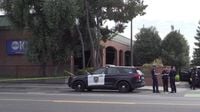On a quiet Friday afternoon in Sacramento, the unexpected shattered the calm: at least three gunshots were fired into the lobby of ABC10, the city’s local ABC affiliate. The incident, which happened on September 19, 2025, sent shockwaves through the newsroom and the community, but miraculously, no one was injured. The glass of the lobby bore the brunt of the attack, but the bullets never found a human target—a fact that, as reported by ABC News, left many counting their blessings.
The man at the center of this drama, identified by authorities as Anibal Hernandez Santana, was quickly thrust into the spotlight. According to reporting by ABC10 and the Sacramento Police Department, Hernandez Santana was arrested the following day after a dramatic sequence of events that underscored the tension and confusion surrounding the case. On Saturday, September 20, the FBI took him into custody, just hours after he had posted bail and been released from Sacramento County Jail on local charges. The federal charges against him—violation of statute 47 USC 33, which pertains to interfering with federally licensed stations—added a new layer of gravity to the situation.
The local charges Hernandez Santana faces are no less serious. As outlined by the Sacramento County Sheriff’s Office, he is accused of assault with a deadly weapon, shooting into an occupied building, and negligent discharge of a firearm. These charges stem directly from the Friday incident, which police say involved Hernandez Santana firing multiple rounds into the ABC10 office lobby while staff were present inside. The motive, however, remains elusive. Sacramento police have not released any information about what might have driven the attack, leaving the community and the newsroom searching for answers.
The arrest itself unfolded in dramatic fashion. Witnesses described a sudden flurry of law enforcement activity in Sacramento’s River Park neighborhood. Angela, a resident who observed the arrest, recounted to ABC10: “We made eye contact and right as he passed my windshield, I heard on a loudspeaker, a whole bunch of officers say ‘Get down on the ground, we’re going to shoot.’ And nine marked and unmarked vehicles were all surrounding my car.” She noted that Hernandez Santana “just had a normal demeanor,” a detail that only adds to the mystery surrounding his actions.
Neighbors who knew Hernandez Santana, or “Al” as he was sometimes called, painted a picture of a man who kept to himself. Destini Rich, another neighbor, told ABC10, “The interactions we did share together were brief. If I had to notice anything about him, it was the fact that maybe he wasn’t always the most friendliest or like welcoming. He wasn’t anyone that I would ever, like, sit and talk to.”
Hernandez Santana’s background is complex. His defense attorney, Mark Reichel, emphasized his client’s distinguished career. “He had a very distinguished career as a lobbyist in the state legislature and he had just retired in the last few years,” Reichel told ABC10. The attorney also expressed surprise at the federal charges, stating, “There hasn’t been any evidence produced or provided about why police think he’s the person involved in Friday’s shooting.” Reichel made it clear that they look forward to defending the charges at Hernandez Santana’s upcoming federal court appearance, scheduled for Monday, September 22, at 2 p.m. Hernandez Santana is also due in Sacramento County Superior Court on Tuesday, September 23, to face the local charges.
Adding another layer to the story is Hernandez Santana’s legal history. According to online court records and reporting by Variety, he previously filed a wrongful termination lawsuit against the nonprofit California Rural Indian Health Board. The suit, however, was withdrawn in 2020, after what was described as a verbal confrontation with supervisors that led to police being called. Sacramento police have acknowledged past interactions with Hernandez Santana, but have not shared details.
The suspect’s online presence has also come under scrutiny. Social media accounts matching Hernandez Santana’s name and likeness posted frequently in the days leading up to the shooting, often criticizing the Trump administration and offering pointed political commentary. In July, one post read: “The authoritarian oligarchy is now complete... Rules don’t apply if election was stolen. FIGHT!” Just hours before the shooting, the same account reposted a video of a Republican Congressman and commented, “This is blasphemy. Can’t believe these Republicans sucking up to their own twisted show.”
The shooting followed a period of heightened tension at ABC10. On September 18, the day before the incident, protests erupted in front of the station’s offices. Demonstrators were reacting to ABC network’s decision to pull Jimmy Kimmel Live after the late-night host made controversial comments regarding conservative activist Charlie Kirk’s assassination. It’s important to note, as ABC10 clarified, that while the Sacramento affiliate is part of the ABC network, it is not owned by ABC but by Tegna, a separate media company. The protests, and the subsequent shooting, have left many in the newsroom and the wider Sacramento community unsettled, raising questions about the intersection of media, politics, and public safety.
Despite the gravity of the charges and the public attention, Hernandez Santana’s defense team maintains that there is no concrete evidence tying him to the shooting. Mark Reichel reiterated to ABC10 that, as of yet, “no evidence has been produced or provided about why police think he’s the person involved.” The legal process is just beginning, with both federal and local court appearances scheduled in the coming days. The community, meanwhile, waits for more information—hoping for clarity, and perhaps, a sense of closure.
As the investigation continues, the incident has sparked broader conversations about the safety of journalists and media workers, particularly in an era marked by political polarization and frequent public protests. The fact that no one was injured in Friday’s shooting is, as many have noted, a small mercy. But the questions it raises—about motive, security, and the volatile intersection of politics and the press—are likely to linger long after the glass in ABC10’s lobby is repaired.

